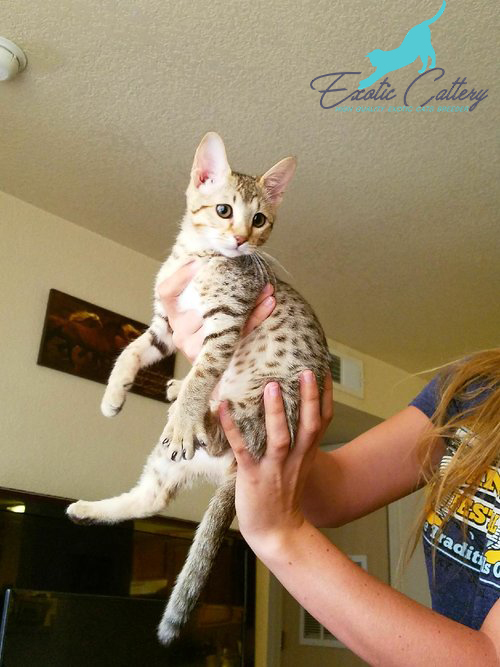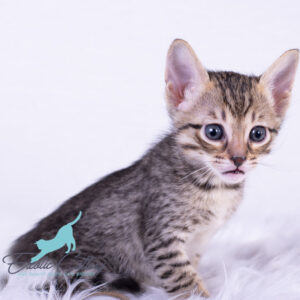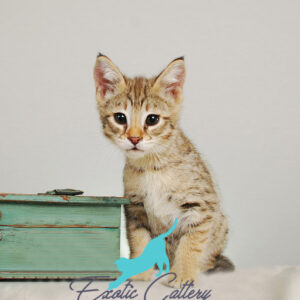Description
What is an F4 Savannah Cat and Why is it So Desirable? – F4 Tica Registered Savannah cats
You’re thinking about adding an F4 Savannah cat to your family. Smart move. Exotic Cattery has the knowledge and experience to produce beautiful exotic cats. Browse our kitten’s available page. For photos of the new arrivals. New arrival of F4 Tica Registered Savannah cats.
But what makes an F4 Savannah cat so special? Why do so many people, including celebrities like Justin Bieber and Serena Williams, go out of their way to own one?
F4 Savannah cats are not your typical house cats. They’re a hybrid cat breed, blending the wildness of the African Serval with the domestic charm of a regular house cat. The “F4” refers to the fourth generation removed from the wild Serval, making these cats an ideal balance of exotic appearance and manageable temperament.
Why are they desirable? These cats are stunning, with their large ears, spotted coats, and long legs. They look like a wild cat but act like a pet. Plus, they’re social, intelligent, and can even learn tricks. Imagine having a cat that looks like it belongs in the wild but cuddles up with you on the couch.
But before you rush out to buy an F4 Savannah cat, it’s essential to understand why getting a TICA-registered Savannah cat is crucial. Let’s break it down.
Why Buy TICA-Registered Savannah Cats?
When purchasing Savannah cats, especially the exotic and sought-after F4 Savannah cats, you want to ensure you’re making a smart investment. That’s where TICA registration comes into play.
The International Cat Association (TICA) is the gold standard for cat breeders. TICA registration means your cat comes from a breeder who adheres to strict standards, ensuring your Savannah cat is healthy, ethically bred, and true to its breed.
When you buy a TICA registered Savannah cat, you’re not just getting a cat; you’re getting peace of mind. This registration assures that your new family member has a verifiable pedigree, which is crucial when dealing with exotic cats. It’s like buying a luxury car with a full-service history—you know what you’re getting is the real deal.
Let’s dive deeper into what makes F4 Savannah cats unique and why TICA registration is non-negotiable.
Understanding F4 Savannah Cats
What Sets F4 Savannah Cats Apart?
So, what exactly is an F4 Savannah cat?
The “F4” stands for “fourth generation.” This means that the cat is four generations removed from the African Serval.
Why does this matter?
As the generations progress from the original Serval, the Savannah cat becomes more domesticated. An F4 Savannah cat still has that wild, exotic look but with a personality that fits better into a home environment.
In other words, you’re getting the best of both worlds—a cat that looks like a wild animal but behaves like a domesticated pet. This balance is what makes F4 Savannah cats highly desirable among exotic pet owners.
F4 vs. Other Savannah Generations
Now, how does the F4 Savannah cat differ from other generations?
- F1 Savannah Cats: These are the first generation from a Serval and a domestic cat. They have a high percentage of wild DNA and can be more challenging to manage as pets.
- F2 and F3 Savannah Cats: These cats are still relatively close to their wild ancestors, with a noticeable exotic appearance but starting to show more domestic traits.
- F4 Savannah Cats: These are where the wild and domestic blend perfectly. They are easier to care for, more social, and still retain that striking, wild appearance.
An F4 Savannah cat is ideal for someone who wants a pet with an exotic look but without the challenges that come with higher-generation Savannahs.
The F4 Tica Registered Savannah cats will be very similar to the F3’s. There is much overlap in terms of size, type and look between the F3, F4, and F5 Savannahs.
The F4 females will not lose size compared to the F3s. They too will be 10-12 pounds and measure a couple inches taller and longer than a typical domestic cat. Not big cats, but taller and lankier in their body proportions than a domestic. The F4 males will usually fall in the 14-18 pound range and will appear to be 1.5 times the size of a domestic. While some domestic cats weigh 15-20 pounds, it is on a smaller, more compact frame. An F4 Savannah Kittens weighing 17 pounds is going to look considerably larger than a domestic cat weighing 17 pounds.
Color of the F4 Tica Registered Savannah cats
The color of the F4 Tica Registered Savannah cats should be very similar to that of the F3. The variety of color options is the same. In general, though, the coloring tends to lose some of the vibrancy that is found in the higher generations. Once again, there will be considerable variation in quality from breeder to breeder. Along with the quality variation will come a price variation. It is at this point that some will occasionally be available in the $500 range. However, to get one that resembles the wild ancestry as much as possible, buyers will generally have to spend more.
The body type of the F4 Tica Registered Savannah cats will also be similar to that of the F3. Some will be extremely types, while others within the same litter will lean more towards that of the domestic cat, being a little shorter legged, rounder-faced, and thicker-middled. Unfortunately, it is difficult to gauge an individual’s body type until they are 8-10 weeks of age, and a lot of kittens are already spoken for by this age. In general, many of the F4 Tica Registered Savannah cats will give up overall substance, appearing frailer and more refined. Some may consider this type, but the Serval is not a frail featured cat.
Why Choose a TICA-Registered Savannah Cat?
Benefits of TICA Registration
When you’re buying an F4 Savannah cat, you’re not just looking for any cat—you’re looking for quality. And that’s where TICA registration comes in.
Here’s why it’s important:
- Health Assurance: TICA registered Savannah cats come from breeders who follow strict guidelines to ensure the health and well-being of the cats. This means fewer health issues down the line.
- Pedigree Verification: With TICA registration, you can trace your cat’s lineage. This is crucial for understanding your cat’s traits and ensuring you’re getting what you paid for.
- Ethical Breeding: TICA breeders are required to meet high standards of care and ethics. This ensures that your Savannah cat is bred humanely and responsibly, which is essential in the world of exotic pets.
- Increased Value: If you ever decide to sell or breed your Savannah cat, a TICA registration adds significant value. Buyers are more likely to trust a breeder or seller who provides TICA papers.
Impact on Value and Care
The impact of TICA registration goes beyond just the purchase price. It affects your Savannah cat’s care and overall quality of life.
- Veterinary Care: Vets are more familiar with TICA registered cats and understand their specific needs better, especially with an exotic breed like the Savannah.
- Insurance: Some pet insurance companies offer better rates or coverage for TICA registered cats because they’re considered to be of higher quality and healthy.
In short, choosing a TICA registered F4 Savannah cat means you’re investing in a healthy, well-bred, and highly desirable pet. And let’s be honest, isn’t that exactly what you want?
Finding a Reputable Breeder
Tips for Locating F4 Savannah Cat Breeders
So, you’ve decided you want an F4 Savannah cat, and you know it has to be TICA registered. The next step is finding the right breeder.
Here’s how you do it:
- Research Online: Start by searching for Savannah cat breeders who are TICA certified. Check their websites, read reviews, and look for any red flags like negative feedback or lack of TICA registration information.
- Visit TICA Cat Shows: Attending TICA cat shows is a great way to meet breeders in person. You can see their cats, ask questions, and get a feel for how they operate.
- Ask for References: A reputable breeder will have no problem providing references from previous buyers. Talk to these people to get an idea of what to expect.
- Check Their Facility: If possible, visit the breeder’s facility. Look at the conditions the cats are kept in. Are they clean, well-fed, and socialized? This tells you a lot about the breeder’s standards.
Red Flags to Avoid
Not all breeders are created equal. Here’s what to watch out for:
- No TICA Registration: If a breeder can’t provide TICA registration papers, walk away. This is a major red flag that could indicate unethical breeding practices.
- Poor Living Conditions: Cats kept in dirty or overcrowded conditions are likely to have health or behavioral issues.
- Lack of Communication: A good breeder will be responsive and willing to answer all your questions. If they’re hard to reach or vague in their answers, that’s a bad sign.
Finding the right breeder is crucial. It ensures that your F4 Savannah cat is healthy, well-socialized, and worth every penny. And remember, at Exoticcattery.com, we specialize in breeding high-quality, well-socialized Savannah kittens that fit seamlessly into your family.
Every step you take in this process should lead you closer to a healthy, happy, and well-adjusted Savannah cat.
What to Expect When Purchasing an F4 Savannah Cat
Price Ranges for F4 Savannah Cats
So, you’re ready to make the leap and purchase an F4 Savannah cat. But how much should you expect to pay?
The price of an F4 Savannah cat can vary widely, depending on factors such as the breeder’s reputation, the cat’s lineage, and whether it is TICA registered. On average, you can expect to pay anywhere from $1,000 to $5,000 for a well-bred, TICA certified F4 Savannah cat.
Here’s a quick breakdown of what influences the price:
- Pedigree: Cats with a strong lineage that includes show-quality ancestors will command a higher price.
- Breeder Reputation: TICA-certified breeders who are known for producing healthy, well-socialized cats tend to charge more.
- Appearance: Cats that closely resemble the wild Serval—with bold spots, large ears, and long legs—are often more expensive.
- Health Guarantees: Some breeders offer health guarantees or insurance for the first year, which can also add to the cost.
When considering the price, remember that buying a cheaper cat from a less reputable source could end up costing you more in vet bills and behavioral issues down the line. Quality is key, and that’s what you’re paying for.
The Purchasing Process: What You Need to Know
Once you’ve found a reputable breeder and agreed on a price, the next step is the actual purchase. Here’s what to expect:
- Initial Contact: Most breeders will ask you to fill out an application form or have an initial consultation to ensure that you’re a good fit for one of their cats. This is especially important for exotic pets like F4 Savannah cats.
- Deposit: To reserve your kitten, you’ll usually need to put down a deposit. This is typically around 25-50% of the total price. Make sure you get a receipt and that the terms are clear.
- Contract: A good breeder will provide a purchase contract. This document will outline the terms of the sale, including the price, health guarantees, and any responsibilities you have as the new owner. Ensure that the contract specifies that the cat is TICA registered and includes the registration number.
- Final Payment: Before you take your kitten home, you’ll need to pay the remaining balance. Most breeders accept various payment methods, but it’s essential to ensure everything is above board.
- Pickup or Delivery: Depending on where you and the breeder are located, you may need to arrange for transportation. Some breeders offer shipping services, but it’s always best if you can pick up the kitten in person. This way, you can see the facility and ensure everything is as expected.
- TICA Registration Papers: Upon purchase, the breeder should provide you with the TICA registration papers. These documents are crucial for verifying your cat’s pedigree and are essential if you plan to breed or show your cat in the future.
- Follow-Up: A good breeder will offer support after the sale. Whether it’s advice on care, feeding, or settling your new cat into your home, they should be there to help. At Exoticcattery.com, we pride ourselves on providing ongoing support to our clients.
Caring for Your F4 Savannah Cat
Basic Care Guidelines
Congratulations! You’ve now welcomed an F4 Savannah cat into your home. But owning such an exotic pet comes with its own set of responsibilities.
Here’s what you need to know about caring for your new feline friend:
- Diet: Savannah cats are active and have a high metabolism. Feeding them a balanced diet is crucial. Opt for high-quality, protein-rich cat food, and consider supplementing with raw meat. Avoid cheap, low-quality food as it can lead to health problems down the line.
- Exercise: These cats are energetic and need plenty of exercise. Invest in cat playhouses and interactive toys to keep them stimulated. Regular playtime will also help prevent behavioral issues.
- Socialization: F4 Savannah cats are social animals. They thrive on interaction with their human families and can even get along with other pets. Make sure to spend time bonding with your cat every day.
- Veterinary Care: Regular vet check-ups are essential. Choose a vet who is familiar with exotic cats to ensure your Savannah cat receives the best care. Keep up with vaccinations, parasite control, and dental care.
- Grooming: While Savannah cats are relatively low-maintenance in terms of grooming, regular brushing helps to keep their coat healthy and reduce shedding.
Understanding the Social and Environmental Needs of Savannah Cats
F4 Savannah cats are unique in that they combine the wild instincts of their Serval ancestors with the domestic nature of house cats. This makes their social and environmental needs a bit different from other cats.
- Social Needs: Savannah cats are known for their loyalty and strong bonds with their owners. They don’t do well when left alone for long periods. If you work long hours, consider getting a second cat or pet to keep your Savannah company.
- Environmental Enrichment: These cats love to climb, jump, and explore. Providing vertical spaces like cat trees or shelves can make a big difference in their happiness. They’re also known to enjoy water, so don’t be surprised if your F4 Savannah cat tries to join you in the shower!
- Safety Considerations: Due to their strong prey drive, it’s best to keep Savannah cats indoors. If you want them to experience the outdoors, consider training them to walk on a leash or setting up a secure outdoor enclosure.
By understanding and meeting these needs, you’ll ensure that your F4 Savannah cat is not only healthy but also happy and well-adjusted.
FAQs About F4 Savannah Cats
Q: How big do F4 Savannah cats get? A: F4 Savannah cats are typically smaller than earlier generations but still larger than most domestic cats. They can weigh between 12-20 pounds and stand about 14-17 inches tall at the shoulder.
Q: Are F4 Savannah cats good with children and other pets? A: Yes, F4 Savannah cats are generally good with children and other pets, especially if they are socialized from a young age. Their playful and social nature makes them great companions, but it’s always a good idea to supervise interactions with younger children.
Q: Do F4 Savannah cats require special care? A: While they don’t require special care in the sense that they need exotic food or habitats, they do have higher energy levels and social needs than the average cat. Providing them with plenty of exercise, mental stimulation, and social interaction is key.
Q: What should I look for in a breeder? A: Look for breeders who are TICA certified, have a good reputation, and are transparent about their breeding practices. They should be able to provide TICA registration papers, health guarantees, and references from past buyers.










